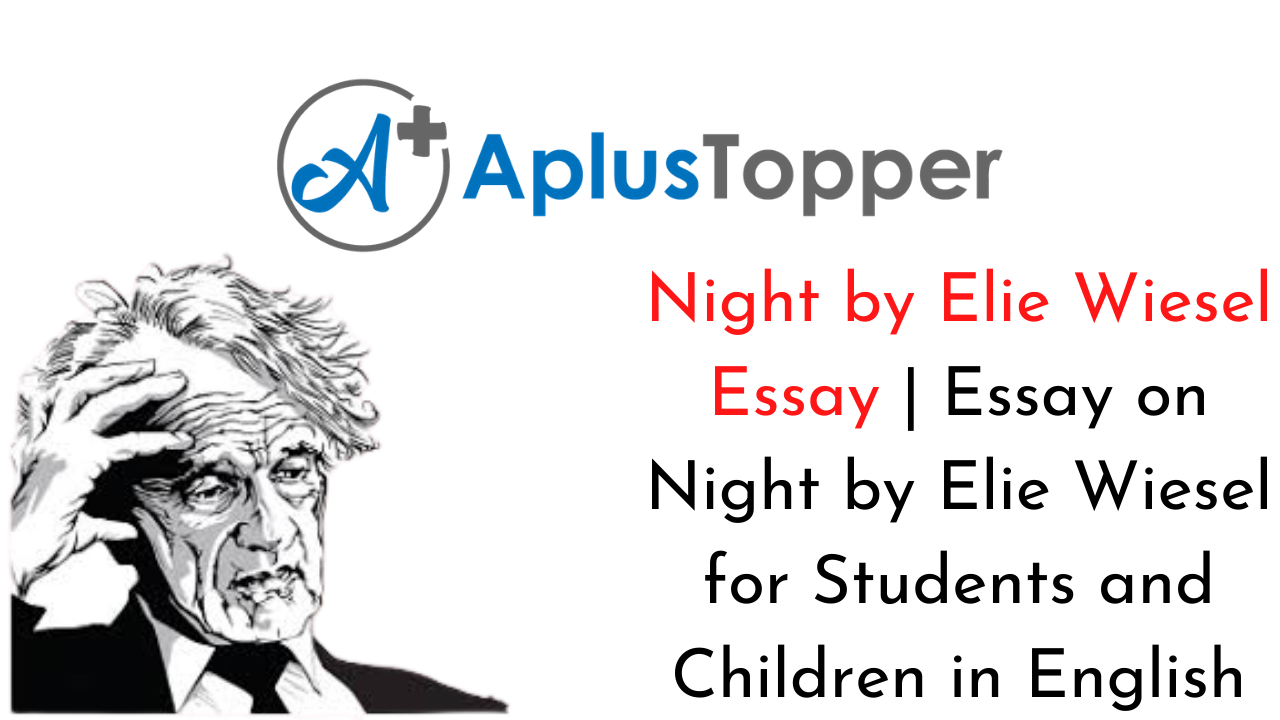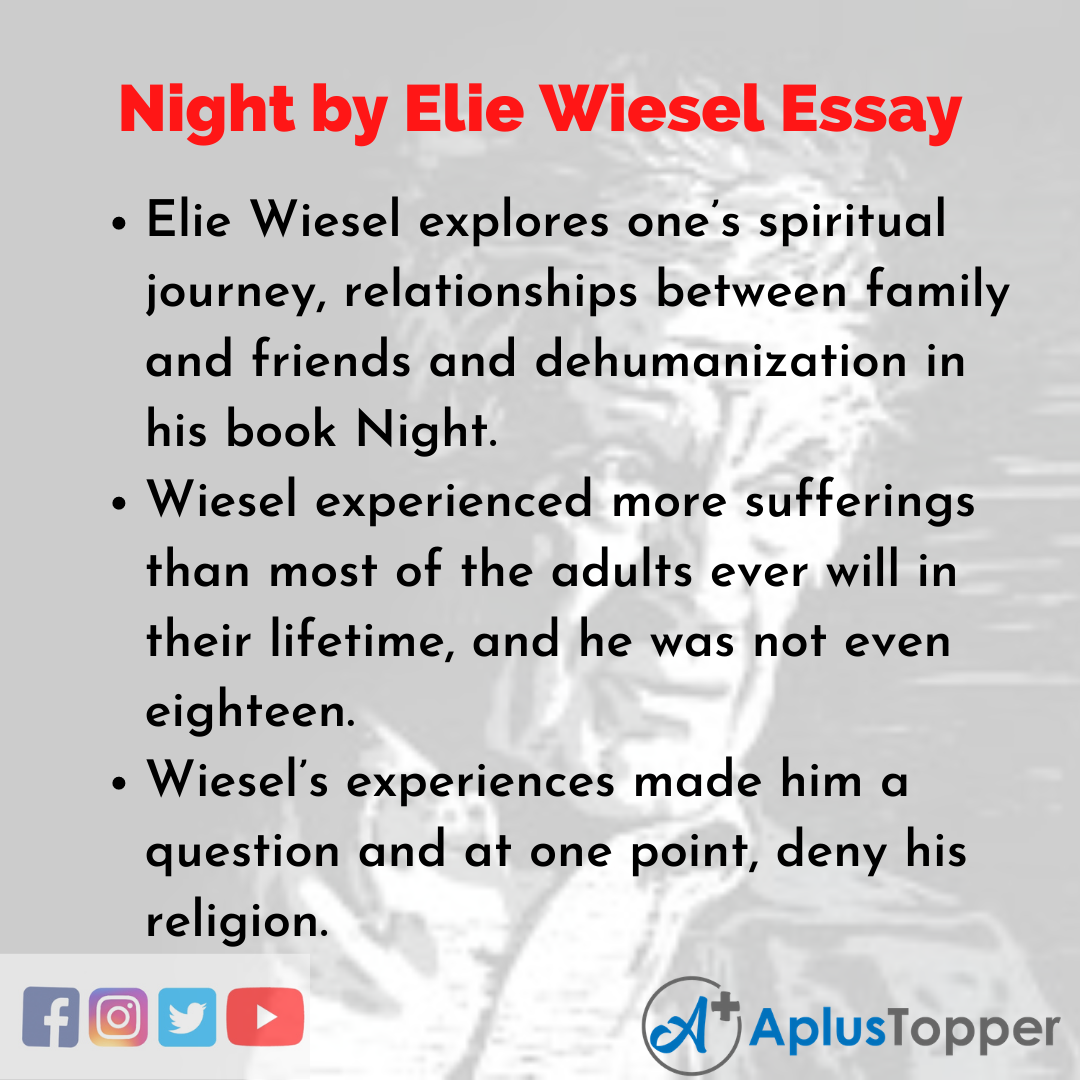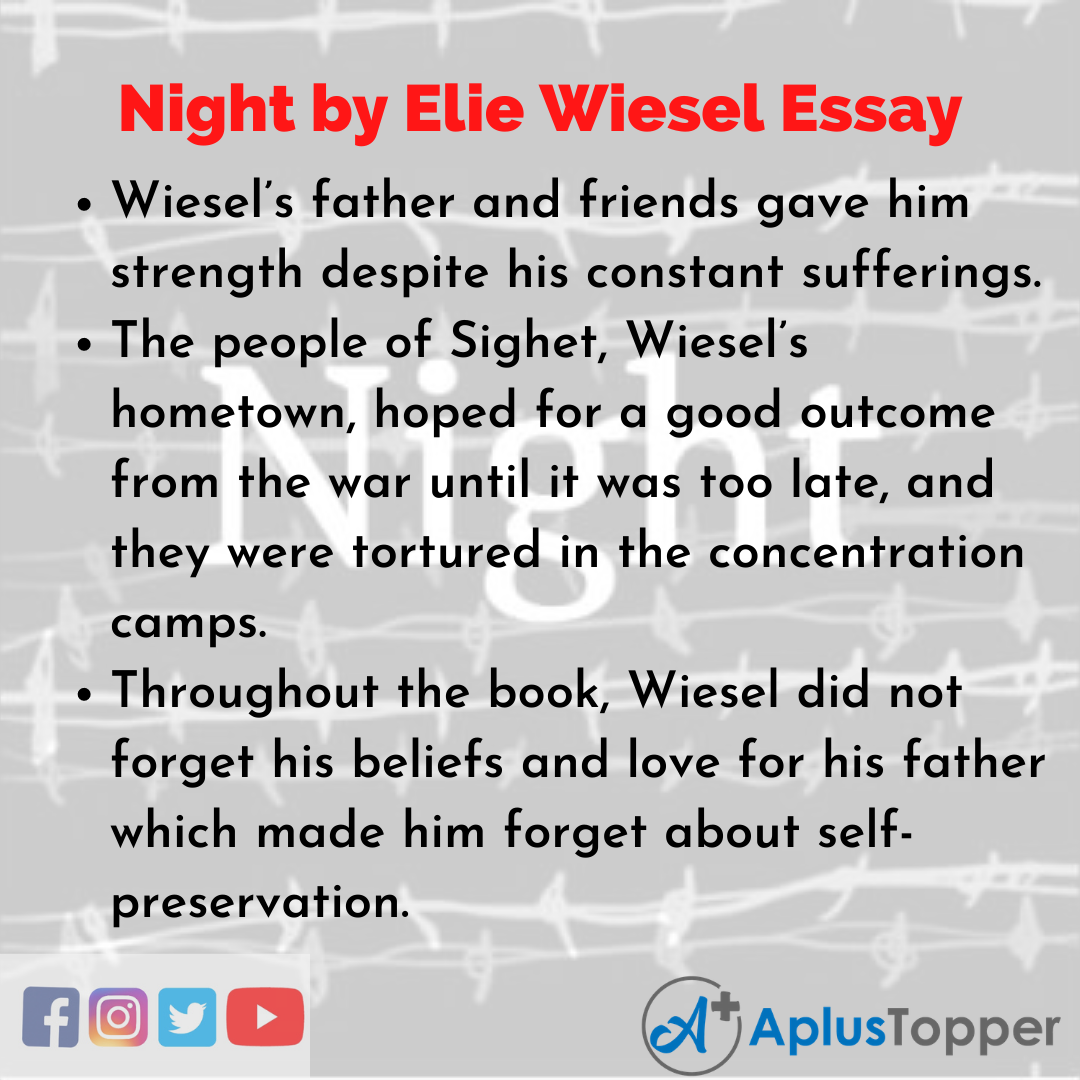Night by Elie Wiesel Essay: Night written by Elie Wiesel tells the stories of survivors of the Holocaust. During the Holocaust Wiesel’s family were slaughtered in Nazi camps.
Wiesel was held at a concentration camp in Buchenwald. He experienced horrible incidents. Still, he was able to survive from that nightmarish experience.
You can also find more Essay Writing articles on events, persons, sports, technology and many more.
Long and Short Essays on Night by Elie Wiesel for Students and Kids in English
We are providing students with essay samples on an extended essay of 500 words and a short essay of 150 words on Night by Elie Wiesel for reference.
Long Essay on Night by Elie Wiesel 500 Words in English
Long Essay on Night by Elie Wiesel is usually given to classes 7, 8, 9, and 10.
The Night is a book written by Elie Wiesel, and it tells about the author’s experience with his father in the Nazi German concentration camps at Buchenwald and Auschwitz between the year 1944-1945, toward the end of Second World War at the height of the Holocaust.
Wiesel wrote about the death of god and his disgust with humankind in just over 100 pages of fragmented and sparse narrative. His disgust was reflected in the overturn of the parent-child relationship as Wiesel becomes a resentful teenage caregiver to his father, who declines to a helpless state. In April 1945, when Wiesel was just 16 and Buchenwald was liberated by the United States Army it was too late for his father. The latter was dead after receiving beating while Wiesel laid quietly on the bunk above due to the fear of being beaten too.
After the war was over, Wiesel moved to Paris and in 1954 completed a manuscript of 862 pages in Yiddish about his experiences which was published in Argentina as the Un di Velt Hot Geshvign with 245 pages also known as And the World Remained Silent. Francois Mauriac, a well-known novelist, helped Wiesel find a French publisher.
In 1958 La Nuit was published by Les Editions de Minuit with 178 pages and in 1960 Night was published by Hill and Wang in New York which was a 116-page translation. The book ranks as one of the foundational books of the Holocaust literature, and it has been translated into thirty languages.
Although Wiesel called Night his deposition, scholars have had trouble approaching it as an unembellished account. The trimming of the text from Yiddish to French transformed an angry historical encounter into a work of art according to the literary critic Ruth Franklin. Wiesel’s transition throughout and after the Holocaust from light to darkness is revealed in the trilogy – Night, Dawn and Day and Night is the first book because according to the Jewish tradition the beginning of a new day is at the nightfall.
The main protagonist of Night Eliezer is continuously torn between an interest in self-preservation and a sense of filial duty of a son. He always doubts if his life is worth saving or not whenever he abandons his father, but each time, he aids his father, he feels that he is putting himself in danger. Eliezer frequently ignores his fears and helps his father selflessly.
By making an implicit contrast between Eliezer and the less fortunate characters, Wiesel demonstrates that love has more supporting power than food, sleep and physical strength. The dignity and humanity are stripped off from Auschwitz prisoners to such an extent that several people chooses to abandon their loved ones for the interest of self-survival. But in the end, these men do not survive. A weak boy who has repeatedly risked his own life to aid his father, Eliezer survives and emerges from the death camps to tell about his stories, so his love kept him alive.
Short Essay on Night by Elie Wiesel 150 Words in English
Short Essay on Night by Elie Wiesel is usually given to classes 1, 2, 3, 4, 5, and 6.
The Night is a terrifying but powerful autobiography written by Elie Wiesel. Wiesel or Eliezer was born in the town of Sighet in Transylvania. He was sent away to the concentration camps after he moved to the ghetto when he was just a teenager. Wiesel gave the first-hand account of Holocaust survivor and explained the horrific events of the Holocaust.
Wiesel illustrates through his use of description that he too believes that there is the hope of humanity even in the shadiest of circumstances. According to Wiesel, ‘night’ in his novel symbolizes the beginning of his journey as a 15-year old Jewish boy living throughout the Holocaust. He explained how he lost all his thoughts and feelings during this time when he experienced horrific things in five different concentration camps. The book explained how the characters were so blinded by sickness, hunger, fear and cold that they didn’t realize their actions in the hopes of increasing their chances of survival.
10 Lines on Night by Elie Wiesel in English
- Elie Wiesel explores one’s spiritual journey, relationships between family and friends and dehumanization in his book Night.
- Wiesel experienced more sufferings than most of the adults ever will in their lifetime, and he was not even eighteen.
- Wiesel wrote his experience as a survivor of the Holocaust.
- Wiesel optimistically walked into the first camp and walked out of the last camp without any revenge feelings in his heart.
- Wiesel’s experiences made him a question and at one point, deny his religion.
- The laborious process through which the prisoners had to go through in the concentration camps left them lacking individual identities.
- Wiesel’s father and friends gave him strength despite his constant sufferings.
- The people of Sighet, Wiesel’s hometown, hoped for a good outcome from the war until it was too late, and they were tortured in the concentration camps.
- Every moment faced by Wiesel in the concentration camp brought him new scars mentally and sometimes physically too.
- Throughout the book, Wiesel did not forget his beliefs and love for his father which made him forget about self-preservation.
FAQ’s on Night by Elie Wiesel Essay
Question 1.
How many camps did Wiesel endure during the Holocaust?
Answer:
Wiesel endured five concentration camps: Buchenwald, Auschwitz, Buna, Birkenau and Gleiwitz.
Question 2.
What is the central theme of the book Night?
Answer:
The central theme of the book Night is the loss of faith in God as Eliezer witnesses and experiences things that he cannot connect with the idea of a fair God.
Question 3.
What does silence denote in the book Night?
Answer:
Silence is a theme that occurs numerous times through the book Night, and Wiesel uses silence to show how important it is for an individual to feel heard.


